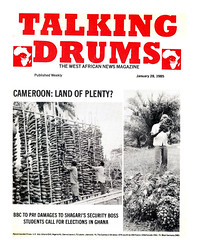OAU needs both Morocco and Polisario
By Ben Mensah
The name and charter of the Organisation of African Unity provide that apart from apartheid South Africa every independent African country must be an automatic member. The OAU puts much emphasis on unity among African countries and its decisions are carried by a two- thirds majority as against simple majority decisions.After two successive abortive attempts in 1983 to hold a summit, the success of the 1984 OAU summit in Addis Ababa, Ethiopia deserves to be hailed as a great landmark in the history of the continental organisation.
The success of the summit was achieved following Morocco's withdrawal from the meeting and the Organisation which paved the way for the admission of the Polisario Front which at that time had the support of more than half the OAU membership.
The argument in favour of the Polisario was that it was a victim of colonialism by Morocco which had thwarted all efforts at a referendum sponsored by the OAU in which the people of the disputed area could have decided whether to be part of the Kingdom of Morocco or an independent state of Sahrawi Arab Democratic Republic.
Since the OAU itself emerged out of decolonisation it was not unexpected that the majority of its membership sided with the Polisario in what they perceived as a conflict between a colonial power and a colony.
It is however significant that in 1963 when the seeds of the Pan African Organisation were being sown by such firebrands as Kwame Nkrumah, Sekou Toure etc they were so blinded by the euphoria over Africa's decolonisation success that they did not realise they were holding their first summit in the capital of Imperial Ethiopia to be presided over by Emperor Haile Selassie whose rule over Eritrea and claim over parts of Somalia and Kenya were being disputed. Today the Organisation of African Unity is headquartered in Addis Ababa yet the war for independence by the people of Eritrea has not subsided.
It is also significant that in 1963 Imperial Morocco played such a leading role in the founding of the OAU without the least suspicion that after the withdrawal of Spain from the area, the Polisario would emerge to use the Pan African platform to brand her a colonial power and eventually push her out of the organisation.
It is again noteworthy that Libya, which has been accused by Chad of having colonised part of its territory, Aozou Strip, continues to be a member of the OAU.
The OAU's dilemma over the Morocco and Polisario conflict came to a head in 1982 when the then Secretary General of the Organisation, Mr Edem Kojo invited the Polisario to that year's summit as a member. Even though the decision had the majority support, Morocco and her friends managed to deprive the summit of the required two-thirds quorum to enable the meeting to take off. The next meeting could only be held after the Polisario had been persuaded to withdraw from it.
In 1984 however, the Polisario, actively supported by the erstwhile neutral countries, such as Nigeria, could no longer be prevented from taking its seat at the summit thereby necessitating Morocco's exit from the OAU.
In 1963 Imperial Morocco played a leading role in the founding of the OAU without the least suspicion that after the withdrawal of Spain from the area, Polisario would emerge to use the Pan African platform to brand her a colonial power and eventually push her out of the organisation
While Morocco remained a member and the Polisario stayed out, the Organisation of African Unity was constantly threatened with disintegration. But with Morocco's exit and Polisario's admission, the OAU had resumed its cohesiveness which enabled it to hold a successful summit in Addis Ababa last year.
The joy of that meeting was that for the first time in five years, African leaders were able to discuss economic and social problems of the continent and to initiate moves to attain by the year 2000 the economic community that was envisaged by the first OAU economic summit in Lagos in 1980.
In such circumstances, the loss of Morocco may have been made insignificant by the revivalism Polisario's membership has brought to the OAU. However, a dispassionate appraisal of Morocco's departure would also suggest an unfortunate precedent which could cripple the OAU in future.
It is significant that at the time of Morocco's withdrawal, another member country, Zaire, did not only show solidarity with the Moroccans by withdrawing from the summit but did go further to suggest another African organisation which would exclude the North Africans. This suggestion has so far not been endorsed by any other nation but the hint of another continental forum coupled with Morocco's withdrawal is likely to facilitate the probable withdrawal of other disaffected member countries from the organisation.
Secondly the name and Charter of the Organisation provide that apart from apartheid South Africa every independent African country must be an automatic member of the Organisation. Unlike other continental organisations, the OAU puts much emphasis on unity among African countries and its decisions are carried by a two-thirds majority as against simply majority decisions. But with the exit of Morocco, a situation has arisen where a sovereign African country is not a member of the OAU.
It is on account of these implications that Morocco's departure from the OAU should not be hailed as a victory for the Organisation but a tragedy which must be reversed and never be allowed to reoccur. The OAU needs both Morocco and the Polisario to settle their differences amicably to ensure the continent's final victory over its backwardness and poverty.
